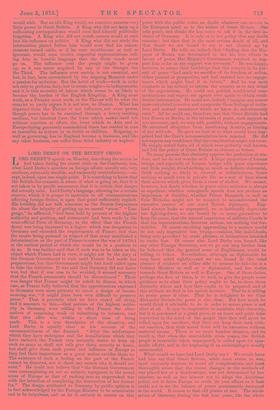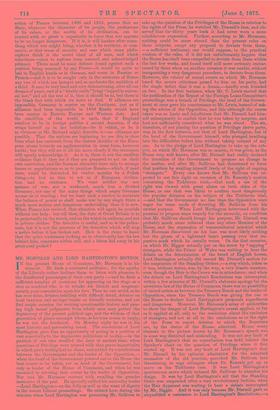LORD DERBY ON THE RECENT CRISIS.
T4ORD DERBY'S speech on Monday, describing the action he had taken during the recent crisis on the Continent, was, what Lord Derby's speeches on foreign affairs usually are, very cautious, extremely sensible, and eminently unsatisfactory,—ex- cept, indeed, upon one single point. It is something to know that the British Government is aware of what is going on, that it is not taken in by pacific assurances, that it is certain that danger did actually exist. Lord Derby's language, allowing for a certain reserve, which it is proper to maintain in all communications affecting foreign States, is upon that point sufficiently explicit. His lordship did not talk nonsense, as the Bourse frequenters do, about the iniquity of getting up an unreal "scare." "Lan- guage," he affirmed, "had been held by persons of the highest authority and position, and statements had been made by the semi-official Press of Germany, to the effect that the French Army was being increased to a degree which was dangerous to Germany and exceeded the requirements of France, and that the course being pursued in respect of that army manifested a determination on the part of France to renew the war of 1870-1 at the earliest period at which she would be in a position to do so. It was further said that if such was to be taken as the object which France had in view, it might not be the duty of the German Government to wait until France had made her preparations, but that Government might feel itself called upon to take the initiative. It was said that Germany did not desire war, but that if war was to be avoided, it seemed necessary that the French armaments should be discontinued." There was danger that France might be asked to disarm, in which case, as France fully believed that the apprehensions expressed in Germany were mere pretexts to cover a design of recom- mencing war, "it might have been very difficult to preserve peace." That is precisely what we have stated all along, and it amounts to this,—that persons of the highest autho-
rity in Germany were willing to offer France the alter- natives of remaining weak or submitting to invasion, and that this offer was within a short time of being made. This is a true description of the situation, and Lord Derby is equally clear in his account of the unreasonableness of the demand. "After the misfortunes which they have undergone and the humiliations which they have endured, the French very naturally desire to keep up such an army as shall not only give them security at home, but shall give them such power and influence in Europe as they feel their importance as a great nation entitles them to. The existence of such a feeling on the part of the French cannot be disputed, nor is there any reason why it should not exist." He could not believe that "the German Government were contemplating an act so entirely repugnant to the moral sense of Europe as that of rushing into an unprovoked war with the intention of completing the destruction of her former foe." The design attributed to Germany by public opinion is in fact acknowledged by the Foreign Minister to be conceivable and to be iniquitous, and as he is entirely in unison on this
point with the public voice no doubt whatever can remain in the European mind as to voice, wishes of Great Britain. She asks peace, and thinks she has cause to ask it in the first in- stance of Germany. It is only as to her policy that any doubt remains ; but then that is the most serious doubt of all, and that doubt we are bound to say is not cleared up by Lord Derby. He tells us, indeed, that "finding that the Em- peror of Russia was determined to use his best efforts in favour of peace, Her Majesty's Government resolved to sup- port him so far as any support was necessary." He was happy, however, to assure their Lordships that this country in its pur- suit of peace "had made no sacrifice of its freedom of action, either present or prospective, and had entered into no engage- ments which might bind it in future." And he was moat emphatic in his refusal to inform the country as to any detail of the negotiations. He could not publish confidential com- munications and expect our agents ever again to obtain confi- dential information. He could not, indeed, "imagine any course more calculated to revive and exasperate those feelings of irrita- tion and mutual uneasiness which we know do unfortunately exist." All he could say, therefore, was that Great Britain had lent Russia at Berlin, in the interests of peace, such support as was necessary, and, we may add, possible, without engagements. He abstained altogether from mentioning Austria, or hinting at her attitude. He gave no hint as to what would have hap- pened had the Czar's recommendation been rejected. He did not express any confidence that the complication might not recur. He simply stated facts, all of which were perfectly well known, and left the policy of Great Britain as obscure as before.
To many persons that obscurity appears the perfection of wis- dom, and we do not wonder at it. A large proportion of human beings, and especially of human beings with great experience and little insight, dread nothing so much as definite statement,
think nothing so likely to succeed as indistinctness, desire nothing so much even in private life as a sort of haze about their actions which gives them a sense of shelter. We cannot, however but doubt whether in grave crises reticence is always so expedient, whether over-gentle speech does not produce an impression of timidity, whether Prince Bismarck as well as Czar Nicholas might not be tempted to misunderstand the excessive reserve of our usual British diplomacy. Eng- land always looks so unprepared, we so habitually depreciate our fighting-force, we are bound by so many guarantees to keep the peace, that the natural impression of military Courts is that our representations, however serious, are nothing but for- malities. Of course anything approaching to a menace would be not only imprudent but wrong,—nations, like individuals, being only provoked by crude phrases or intimations intended to excite fear. Of course also Lord Derby was bound, like any other Foreign Secretary, not to go one step farther than he believed that the general sense of Englishmen would be willing to follow. Nevertheless, although as diplomatist he may have acted rightly—and we are bound in the total absence of evidence on either side to assume he did—he is a Cabinet Minister as well as a diplomatist, and has duties towards Great Britain as well as Europe. One of those duties, perhaps the first of them, is to lead, to give the people some guidance as to what their policy ought to be, to show them distinctly where and how they ought to be prepared, and of
this attitude we find in his speech no trace. That he is willing to praise peace is clear. That he is delighted to see Czar Alexander declare for peace is also clear. But how much he
would think it advisable to do in order to secure peace is not clear at all. It may be imperative to maintain that obscurity,
but it is purchased at a great price, at an inner and quite false
conviction in the mind of the people that they will never be called upon for sacrifices, that they can keep their rank with-
out exertion, that their moral force will be executive without material means. There is no more baseless delusion, and its result is, that when the unavoidable crisis comes, the British people is invariably taken unprepared, is called upon for spas- modic efforts, and in the beginning of an undertaking is usually unsuccessful.
What would we have had Lord Derby say ? We would have had him say that Great Britain, while most averse to war, most anxiously desirous to avoid all complications, and most
thoroughly aware that the recent changes in the methods of war placed her at a disadvantage, was yet determined by her
interests as well as her honour not to adopt the American
policy, not to leave Europe to settle its own affairs as it best could, not to see the balance of power permanently destroyed
in the world. It comes to that old phrase at last. The whole action of Germany during the last four years, like the whole action of France between 1806 and 1815, proves that no State, whatever the character of its people, the professions of its rulers, or the merits of its civilisation, can be trusted with so great a superiority in force that war appears to be no longer dangerous. If it is, it will hanker after some- thing which war might bring, whether it be territory, or com- merce, or that sense of security and ease which some philo- sophers think is the secret ideal of all men, and which sometimes comes to nations from assured, and acknowledged primacy. There must be some defence found against such a position being assumed by any Power—it would be quite as bad in English hands as in German, and worse in Russian or French—and it is to be sought only in the existence of States any two of which can hamper and so moderate the ambition of a third. It may be very hard and very disheartening, after all our dreams of peace, and of a "kindly earth" lying "lapped in univer- sal law," and all the rest of it, that it should be so, but there is the blank fact with which we have to deal. If alliances are impossible, Germany is master on the Continent, just as if alliances had been impossible in 1856 Russia would have been master in Eastern Europe and Western Asia. And the condition of the world is such, that if England resolves to be in foreign politics a second America, if she wraps herself up in her isolation—be it selfish, or be it as virtuous as Mr. Richard might describe it—no alliances are possible. That the nations are beginning to see this is clear from what has occurred, from the instant shudder of the Euro- pean atoms towards an agglomeration in some form, however feeble ; but they will see it all the more clearly if the statesmen will openly acknowledge it. As it is, there is not the smallest evidence that if they see it they are prepared to act on their own conviction, and the German alarmists have only to arrange forces or negotiations so as to paralyse Russia—which, if need were, could be distracted for twelve months by a Polish rising—to feel as free to act as if European civilisa- tion had no existence. We want neither war nor menace of war, nor a weakened, much less a divided Germany, nor any of the many things which angry Germans accuse us of wanting ; but we want such a resolve to maintain the balance of power as shall make war by any single State a much more serious and dangerous undertaking than it is now. When France has revived, that situation will again be possible without our help ; but till then, the duty of Great Britain is to be perpetually on the watch, and on the watch in uniform, and not in private clothes. The detective is useful, and so is the police- man, but it is not the presence of the detective which will stop a melee before it has broken out. How is the rioter to know that the quiet tradesman looking on so observantly has the law behind him, comrades within call, and a baton hid away in his great-coat pocket



































 Previous page
Previous page